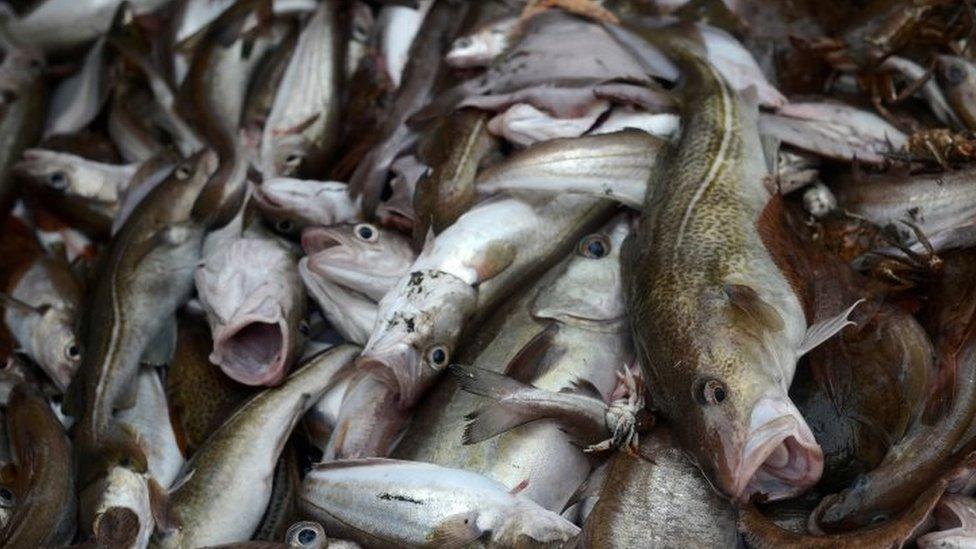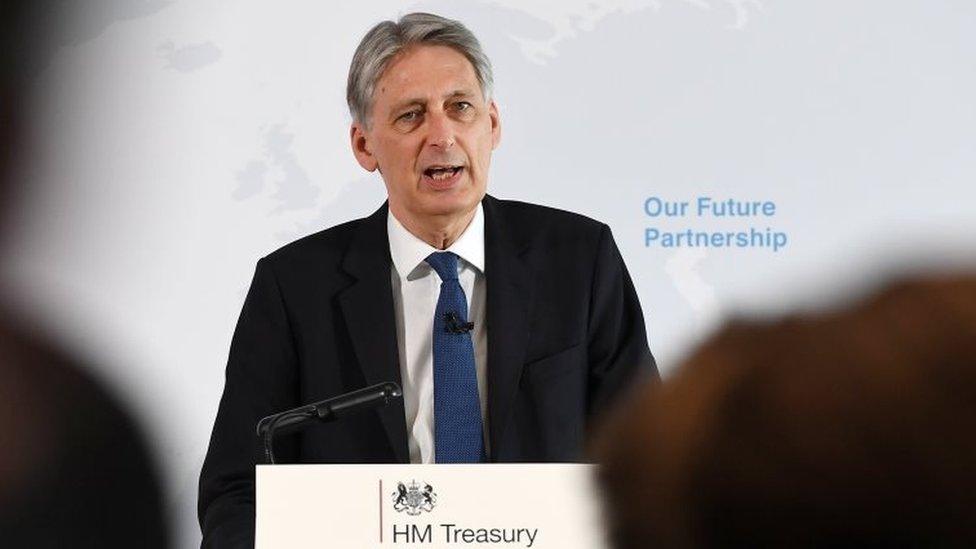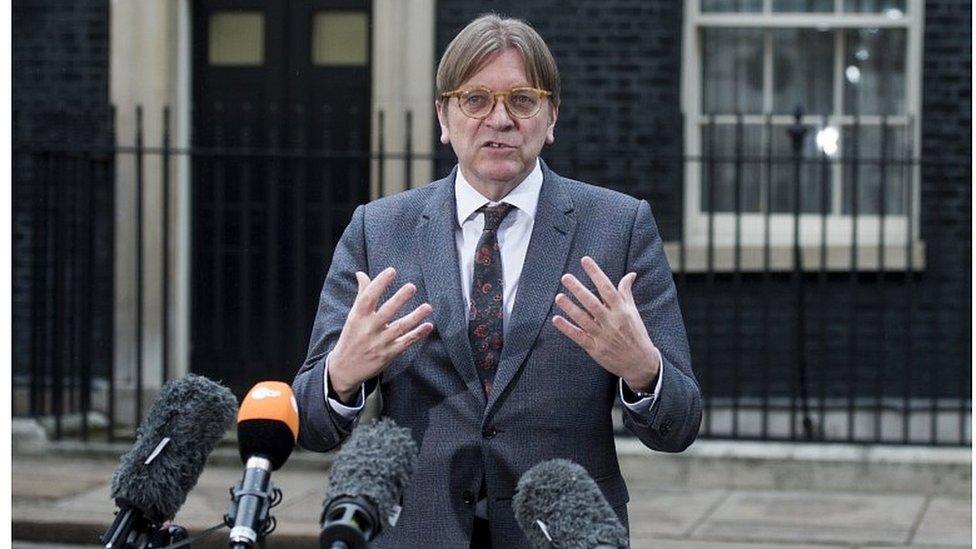Brexit means drifting apart but we don't want to build a wall - Tusk
- Published
- comments
Tusk on Brexit: 'We will be drifting apart'
Donald Tusk has insisted the EU "does not want to build a wall", but Brexit means "we will be drifting apart".
The EU Council president said Theresa May wanted to "demonstrate at any price that Brexit could be a success", but that was not the EU's objective.
He was unveiling draft guidelines for the EU side, external of Brexit trade talks.
Mr Tusk said the EU wanted an "ambitious and advanced" free trade deal - and continued access to UK waters for EU fishing vessels.
"Our agreement will not make trade between the UK and EU frictionless or smoother," he said.
"It will make it more complicated and costly than today for all of us. This is the essence of Brexit."
He said it would be the first time in history that a free trade agreement would "loosen, not strengthen, economic ties".
Donald Tusk doesn't share Theresa May's objective
Donald Tusk: Theresa May's political goal is Brexit success "at any price"
What the EU wants
The draft European Council guidelines call for zero-tariff trade in goods - where the EU has a surplus.
The document also says access for services will be limited by the fact that the UK will be outside the EU and will no longer share a common regulatory and judiciary framework.
The draft guidelines repeat EU warnings that there can be "no cherry-picking" of participation in the single market for particular sectors of industry.
The BBC's Reality Check correspondent Chris Morris said the "narrow negotiating mandate set out in these guidelines suggests that the EU doesn't think it will be much more ambitious than other free trade agreements it has negotiated - Canada is the most obvious example".
Mr Tusk said he wanted continued security and research cooperation and to ensure flights were not grounded.
But he added: "No member state is free to pick only those sectors of the internal market they like, or to accept the role of the ECJ only when it suits their interest."
The draft guidelines also say that the EU will "preserve its autonomy as regards its decision-making, which excludes participation of the United Kingdom as a third-country to EU Institutions, agencies or bodies".
What the UK wants
Theresa May: "We must bring our country back together"
Mrs May acknowledged in her Mansion House speech on Brexit on Friday that neither side would get everything they want from negotiations.
But she also stressed that the UK wanted a bespoke trade deal, rather than an "off-the-shelf" model.
"The fact is that every free trade agreement has varying market access depending on the respective interests of the countries involved," she said.
"If this is cherry-picking, then every trade arrangement is cherry-picking."
She also said: "We will also want to explore with the EU, the terms on which the UK could remain part of EU agencies."
This appears to be in conflict with the EU draft guidelines, although BBC Research has found several examples of non-EU members participating - as a member or observer - in EU agencies and bodies, such as the European Environment Agency and the European Medicines Agency.
What about fishing rights?

The EU says it wants to maintain "existing reciprocal access to fishing waters" - a leading concern of the fishing industry in countries bordering the North Sea.
In her Mansion House speech, Mrs May said: "The UK will regain control over our domestic fisheries management rules and access to our waters."
She added that the UK would want to "work together to manage shared stocks in a sustainable way and to agree reciprocal access to waters and a fairer allocation of fishing opportunities for the UK fishing industry".
Brexit Secretary David Davis - quizzed on Tuesday by Brexiteer Labour MP Kate Hoey - insisted the government would not betray UK fishing communities by "trading away fishing rights" for "other things".
Asked about the EU's demand to keep access as it is now, Chancellor Philip Hammond said the UK was "open to discussing with our EU partners about the appropriate arrangements for reciprocal access for our fishermen to EU waters and for EU fishermen to our waters".
Campaign group Fishing for Leave urged the government not to "cave in" to the EU demands, saying: "Nowhere else is access to fisheries included as negotiating collateral for a free trade agreement."
What about financial services?

Financial services are not mentioned specifically in the EU draft guidelines, but it is shaping up to be a major sticking point.
UK Chancellor Philip Hammond has told European leaders that it is in the "mutual interest" of both the UK and the EU to include financial services in a free trade agreement.
"Given the shape of the British economy and our trade balance with the EU 27, it's hard to see how any deal that did not include services could look like a fair and balanced settlement," he said in a speech.
"Not only is it possible to include financial services in a trade deal, but this is very much in our mutual interest to do so."
But Donald Tusk appeared to reject the UK proposals. The EU says the UK will be treated like any other "third country" after Brexit.
Asked about the EU guidelines, which also warn of the "negative economic consequences" of Brexit, Mr Hammond said: "It does not surprise me remotely that what they have set out this morning is a very tough position. That's what any competent, skilled and experienced negotiator would do."

Analysis by BBC Brussels reporter Adam Fleming
Tusk: Theresa May wants Brexit success "at any price"
Donald Tusk unveiled his guidelines in a picture-perfect castle in the hills outside Luxembourg.
A nice change to the usual venues in Brussels but the same tough message from the EU that the UK's red lines limit what it can get from the final Brexit deal.
The best that's on offer is a free trade agreement on goods with no tariffs, and access to the European markets for the UK service sector - but under EU rules and with no specific mention of financial services.
I asked a sad-sounding Donald Tusk if his offer came anywhere close to what the prime minister had asked for in her Mansion House speech. His pause was epically long, which suggested he knows it is not.
His document is also pretty gloomy, with a spine-chilling warning about the economic costs to the UK.
But there is also a big offer tucked away in a later paragraph - there are other options available if the government is prepared to compromise on its red lines.

What happens now?
The leaders of the remaining 27 EU states must approve the plans at a Brussels summit on 22 March, setting the template for chief negotiator Michel Barnier for talks with the UK about their future relationship.
The UK is due to leave the EU at the end of March 2019, and both sides have said they would like a deal on their future relationship to be agreed by this autumn to allow time for parliaments to approve the deal before Brexit happens.
The European Parliament has its say

The European Parliament's Guy Verhofstadt held talks on Tuesday in Downing Street
The European Parliament has stressed that its preferred option is for the UK to continue to be a member of the single market and customs union after Brexit, in a draft resolution, leaked to the Politico website, external.
The parliament does not have a formal role in the Brexit negotiations but does have a veto on the final deal.
The European Parliament document, which may be changed before it is adopted, says non-EU members - even if very closely aligned to the bloc - cannot expect the same rights and benefits as EU members.
It also warns that the UK's current "red lines" in Brexit talks "would lead to customs checks and verification which would affect global supply chains and manufacturing processes, even if tariff barriers can be avoided".
It says a "deep and comprehensive" trade deal, of the kind envisioned by Theresa May, must entail "a binding interpretation role" for the European Court of Justice.
EU citizenship debate
MPs in Westminster are, meanwhile, debating a call by Plaid Cymru - who have four MPs in Wales - for UK nationals to be allowed to keep their EU citizenship after Brexit.
Plaid said EU citizenship would give holders the right to travel, live, study and work anywhere in the EU even after the UK leaves next year.
A UK government spokesman said only citizens of EU member states could hold EU citizenship.
- Published6 March 2018
